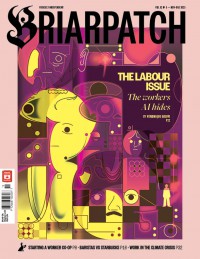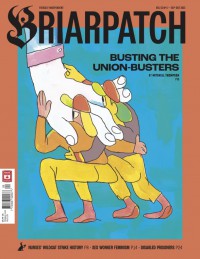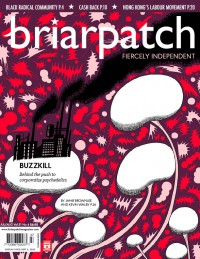-
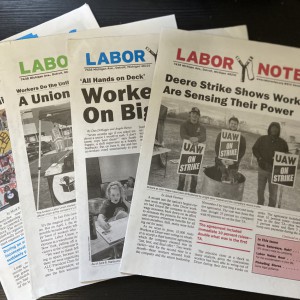 Magazine
MagazineMedia by and for workers: a reading list
Not only do labour-focused publications RankandFile.ca and Labor Notes report on workers’ struggles – they help workers build a stronger labour movement. Here are a few articles for workers looking to organize more strategically.
-
_300_300_90_s_c1.jpg)
-
_300_300_90_s_c1.jpg) Magazine
MagazineThank you, readers
Thank you Briarpatch readers for making this issue of the magazine possible. We’ll do what we can to keep earning that support, for as long as it takes us to bring into being the better world we’re all fighting for.
-
 Magazine
MagazineJournalism with movements in the South
When journalists insist the world’s problems, no matter how big or small, are caused by U.S. government interference, grassroots struggles against austerity and authoritarianism fall out of view.
-
 Magazine
MagazineA reading list on alternative and grassroots media
Alternative media’s promise is that all people have a right to participate in making media, free of commercial and government control. These are a few of the guiding voices on how to build media for people, not profit.
-
 Magazine
MagazineThe dangers of Big Tech funding journalism
Google and Meta are spending millions on programs and awards to help news outlets in crisis. What’s at stake when tech giants are allowed to brand themselves as the saviours of an industry they helped destroy?
-
 Magazine
MagazineIndependent media’s bad labour problem
From union-busting to systemic racism, when bad labour practices have embedded themselves in the very publications trying to write into existence a more just world, what is to be done?
-
 Magazine
MagazineDoing anti-imperialist journalism while the world marches to war
After Russia invaded Ukraine, anything other than support for sending unlimited weapons to Ukraine was painted as pro-Russian propaganda. What does anti-war journalism look like in a climate of social media harassment and state attacks?
-
 Magazine
Magazine“Don’t hate the media, be the media”
How New Brunswick’s Media Co-op is standing up to the Irvings’ corporate power
-
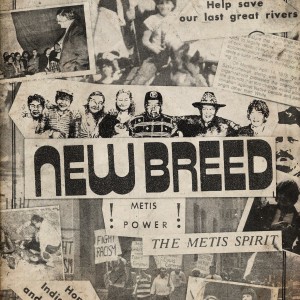 Magazine
MagazineMétis militancy and Saskatchewan media
In the ’70s and ’80s, Saskatchewan’s left was chronicled by two formidable magazines: New Breed and Briarpatch. This is the story of how they made grassroots media in Saskatchewan.
-
 Magazine
Magazine50 years of editing Briarpatch
Four editors reflect on decades of editing Briarpatch: what they learned, the stories that challenged them, what’s changed, and what’s stayed the same.
-
 Magazine
MagazineFile rejected
In 2009, Briarpatch’s $33,000 application to the Canada Magazine Fund was rejected, without explanation, by Stephen Harper’s Minister of Canadian Heritage. It would take an access to information request to reveal that, behind the scenes, the fund’s staff were also being stonewalled by the minister’s office.
-
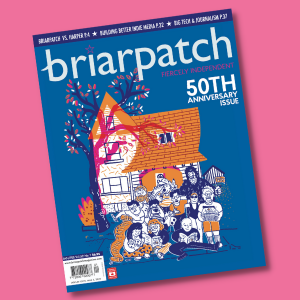 Magazine
MagazineHappy 50th birthday, Briarpatch
This issue tells the story of Briarpatch’s survival, and explores how to build better media in Canada.
-
 Magazine
MagazineThe case for large-scale workers’ media in Canada
Unions, union members, and people with access to wealth need to think big about shifting the media landscape in Canada.
-
 Online-only
Online-onlyWhere there’s smoke, there’s no fire
New Freedom of Information documents show the City of Toronto’s efforts to control the media narrative around encampment evictions last summer – inflating the number of fires in encampments and using media exclusion zones.
-
 Online-only
Online-onlyNo more pandemic platitudes
In her new COVID How-Not-To manual, Nora Loreto takes a month-by-month look at the first year of the pandemic – and the pro-business politicians and docile press that led to its mismanagement.
-
 Magazine
MagazineResearch for transforming the world
An interview with Chris Dixon on doing research with social movements.
-
 Magazine
MagazineOn creativity and commerce
How do we avoid a world in which human creativity and knowledge becomes just another occasion for commerce?
-
 Magazine
MagazineThe HuffPost Canada union is dead. Long live the HuffPost Canada union.
My newsroom unionized. We were shut down two weeks later. Here’s why it was still worth it.
-
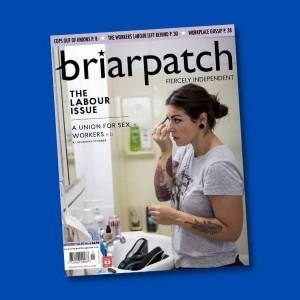 Magazine
MagazineTough conversations about Canada’s labour movement
Where can we speak honestly about the weaknesses of the labour movement, offering constructive criticism and debating paths forward, without making the movement vulnerable to bad-faith attacks by neoliberal columnists and far-right ghouls?

